After the Lula cookbook was published last month, we quickly learned many of our friends had also eaten at the beloved Chicago restaurant, so why not center it for a dinner party? We assigned Plums and Ricotta with Mint Za’atar, Cauliflower with Brown Butter Hollandaise, and Tumeric Tangerine Teacake. I would make the Duck Agnolotti and the Slow-Cooked Short Rib with orange butter-glazed rutabaga and huckleberry sauce. (Thanks for the sous vide, Ray.)
“The flavor is an eight but the texture…” my daughter, Frankie, trailed off, started to laugh. “I give it a four.”
I’d been practicing the agnolotti. I hadn’t scattered nearly enough flour under the rolled sheets of pasta. When it came to folding the sheet over the filling and pinching—the trickiest part of agnolotti—the dough kept sticking to the countertop. Pipe the filling, fold the thin sheet of pasta over the filling, pinch the tube every inch-and-a-half to seal into little pockets. Easy, right? I wasn’t about to confit duck just to practice technique, so I opted for butternut squash filling. I studied YouTube tutorials before the first attempt. My dough was too tacky. When I swiped through each pinched section with the crimp cut roller, they stuck further and exploded butternut squash filling, creating a mess on the counter (and my hands) that reminded me of baby food days. Frankie cut a few and I moved on to patching the holes, crimping and squeezing and licking edges like envelopes. Flour dusted my glasses. It was edging past 6PM. Dropping them into the salted water later was more of a shrug than a tingle of about-to-eat excitement. We were hungry, and it was a weeknight. We had to move on.
I’d rather not be a perfectionist. I’d rather be the type of person to throw a dinner together willy-nilly, leave the onion skins scattered across the kitchen floor, ignore the books and sweaters strewn about as company dings the bell, available instead to the moment and the attendant emotions. But I’m not. I cling to preparation. Every emergence out into the world is an opportunity to perform. Silly as it sounds, a dinner party plays to my greatest insecurities—that I’ll be found out for the imposter I am. Not talented, not smart, unable to regale the table, behind on the happenings of the world, too deep in my own head, which is too far up my own ass to think about other people and just relax already.
Like Jason Hammel describes in the book, I was picking and choosing techniques—which is how he learned how to cook—when practicing the agnolotti. I took Thomas Keller’s butternut squash filling, then another recipe for mushroom duxelle when I tested it the second time for Frankie and her godmother Megan. It was better, but as the day approached I was growing more anxious. The rejection letters for my stories were flowing. Motivation was flagging. My novel was (is) a mess. Running, my precious daily hit of endorphins, had been curbed by an achilles flair up. My grandma was dying in a nursing home in Florida. Bombs were flying in the Middle East. Acapulco was drowning in a sea of trash after hurricane Otis. What were we even doing here? This was supposed to relieve the pressure and allow for some fun. Were we having fun? Was I having fun?
Confit the duck, roast the cippolinis, roast the oranges, whip with butter and zest, peel the rutabagas, cut into two-inch rounds, brown the beef bones, reduce the huckleberry sauce—scratch that, no huckleberries to be found—reduce the blackberry sauce, confit the shallots, mix the dough, rest the dough, roll the dough, flake the duck, mix the—whip the—sear the—peel the—the lists have lists in this book, and it was cricking my neck.
Not until a few hours before the 15 people were set to arrive did I finally settle in. Julian Lage’s “Tributary” came on the stereo, and I took some breaths. Our dear friends Michael and Lindsey came early to help. Immediately, I calmed down. The Cambros were stacked. The mise en place started to come together. We were laughing, Lindsey was dancing, Rebekah was mixing cocktails. Michael was joking with Frankie. I was coming down. Rebekah had been working just as hard on setting the table, getting flowers, finding the right plates, thinking of what people might want or need before, after, during the meal. What other needs could she anticipate? She has a rare gift. “It is our business to ‘take care’ of people. It is our vocation to create joy,” Hammel says in the cookbook’s introduction, but it might as well be tattooed on Rebekah’s heart. Everything would be fine.
The people came. Coats, hugs, intros. I read Ellen Bass’s “Relax,” an admonition as much to myself as to the group. It begins, “Bad things are going to happen. / Your tomatoes will grow a fungus/ and your cat will get run over.” She ends with a Buddhist story of someone being chased by a tiger, hanging by a cliffside vine and inches from death only to find “a wild strawberry growing from a crevice.”
I have the greatest friends in the world. Dahlia couldn't find plums, so she subbed persimmons and apples. The Za’atar glitzed up the otherwise heavy ricotta and sang with herby sophistication. Lindsey’s hollandaise was a sinful delight, sweet and earthy with the cauliflower, and the crunch from the “party crunch,” a mix of sunflower seeds, amaranth, shallots, and black lime powder, left me scraping bits and trying to get them stuck in my teeth. Our friend Heidi brought a gorgeous, zippy arugula salad, which raked us out in preparation for the duck and the beef. Our friends Jay and Greta brought sourdough and butter—butter we mused about for the rest of the night. Leslie’s cake? I didn’t eat it. I took it like a pill. It was moist and deep-down sweet (that’s the best kind of sweet) and the turmeric gave it a funky layer of musk that, as Hammel implies in the recipe notes, haunted me for days.
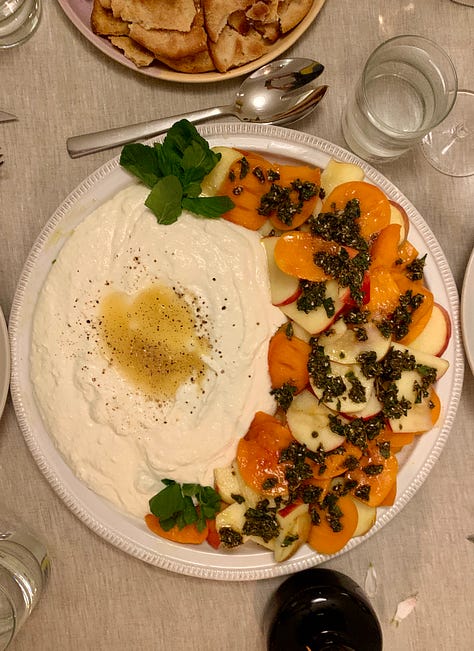
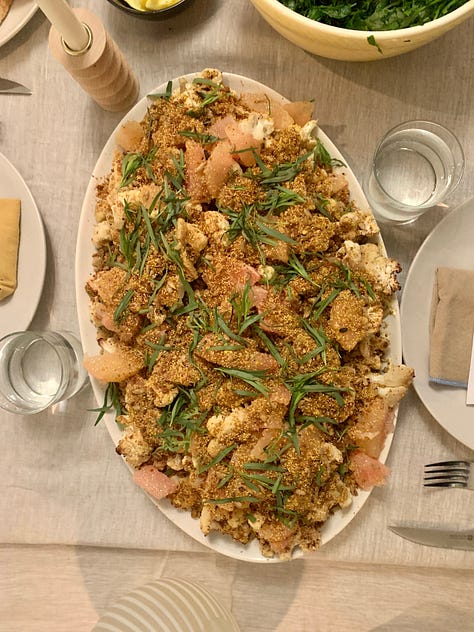
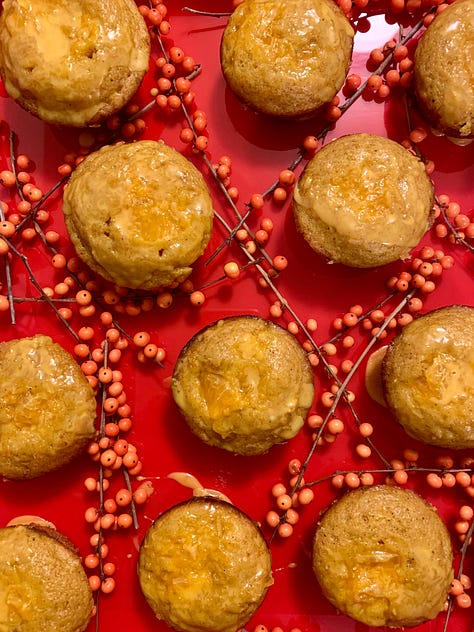
+++
You can see the restaurant format come through in the recipes. A lot of recipes have many steps, but the final “pickup time” is short. Sear some meat. Heat up a sauce and toss the pasta, swoosh your sauce and plate your veggies. Not all the recipes require, say, duck confit, though. There are humble soups, salads, and pastas that your kids might ask you to put in the weeknight rotation, but a lot of the recipes here teach technique, and the component parts feel just as important as the whole dish. If you’re that kind of cook, hungry for technique, Hammel offers many tricks and “building blocks” (there’s a handy section in the back of the book) that you might put in your repertoire to snazz up a humble side dish or keep in your fridge as late-night snack muses. (See the whipped goat cheese and the green harissa.)
The stories in the opening pages are just as joyous as the recipes. Hammel describes going to school to be a writer and eventually studying with David Foster Wallace. He lovingly recalls his early days in Chicago, staying out late, going to shows, befriending artists of all kinds, and eventually meeting Amalea Tshilds, with whom he would start a ragtag soup-delivery business and, year later, marry and partner to create Lula. They were not trained as chefs and never set out to snatch a James Beard. They learned from cookbooks and by eighteen-hour days where they just figured it out. They began humbly, piecemeal, thrifting chairs and using milk crates for shelves. I smiled the entire time I read through the introduction, recognizing so much of myself in the story—trying desperately to be a writer, working in restaurants, falling in love with a music-minded person, befriending artists of all kinds—but more, recognizing the joy that’s gone into Lula, the joy of sharing food with friends, and the joy of taking care of people.
+++
Hungry? You can order the cookbook straight from the Lula website. What are you cooking? Oh, and check out this video of Hammel’s speech on showing up for yourself and silencing the critical voices.

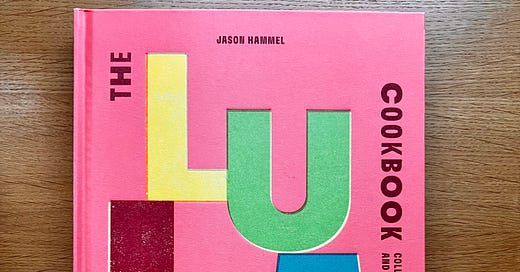




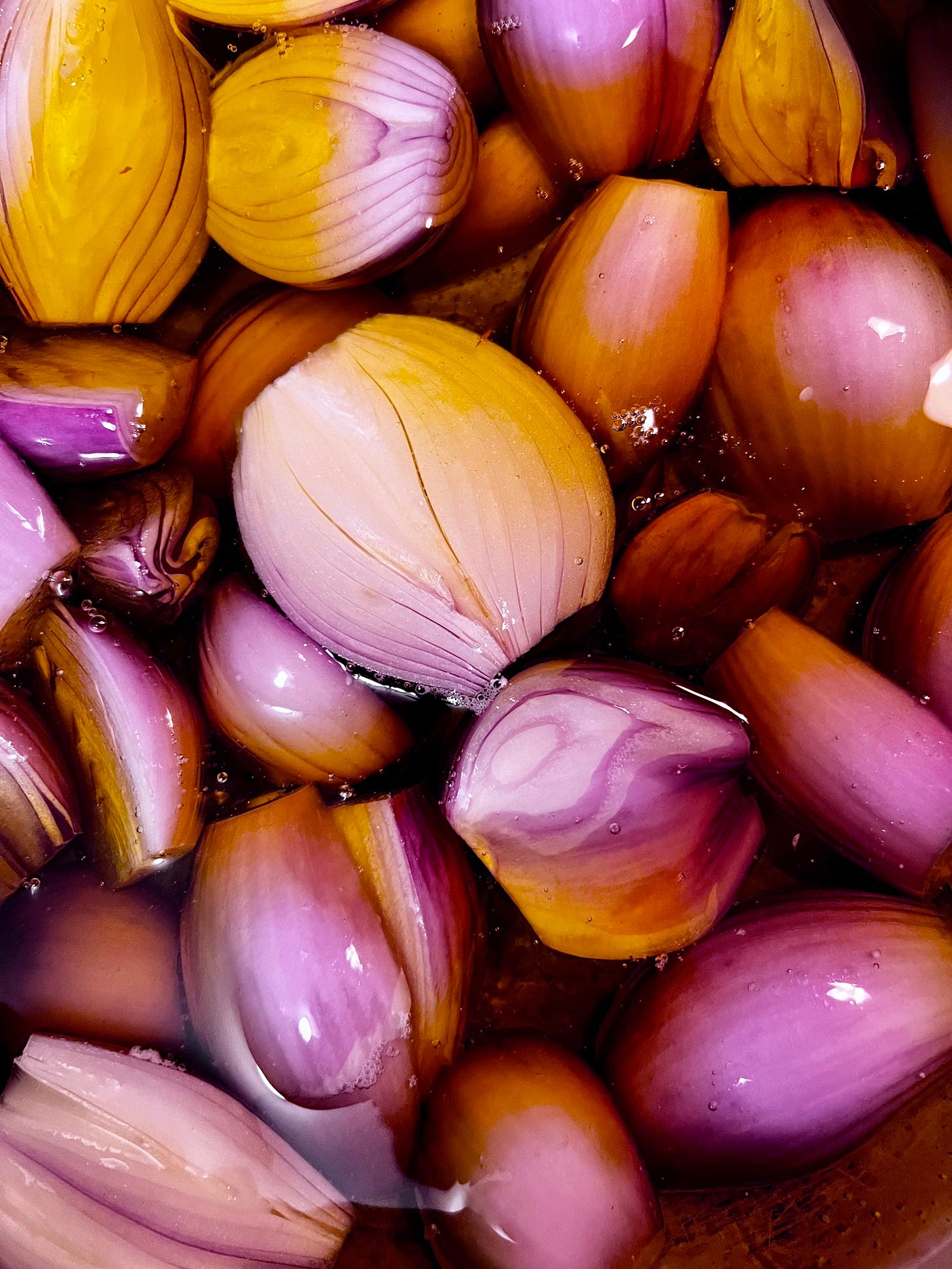
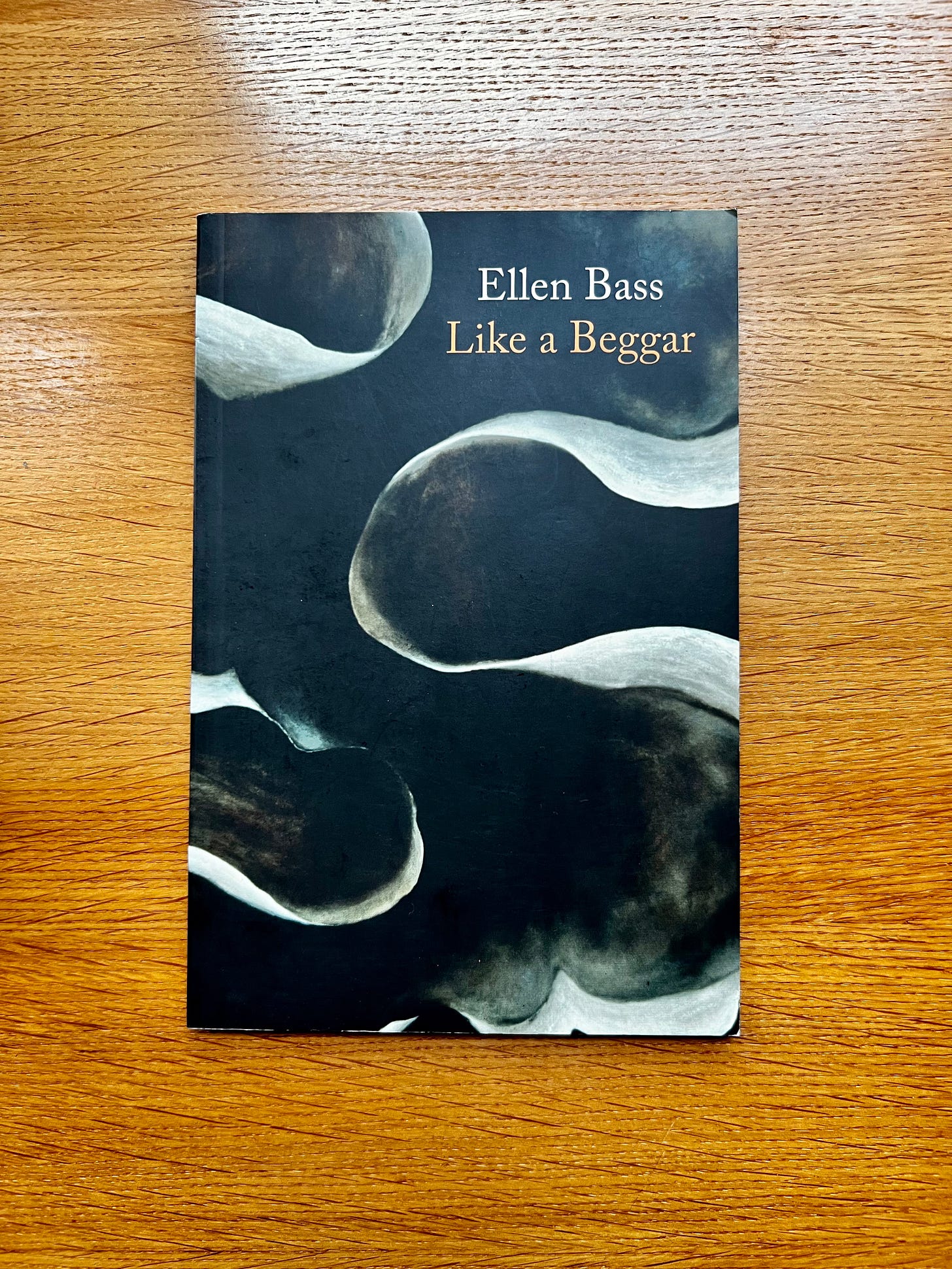
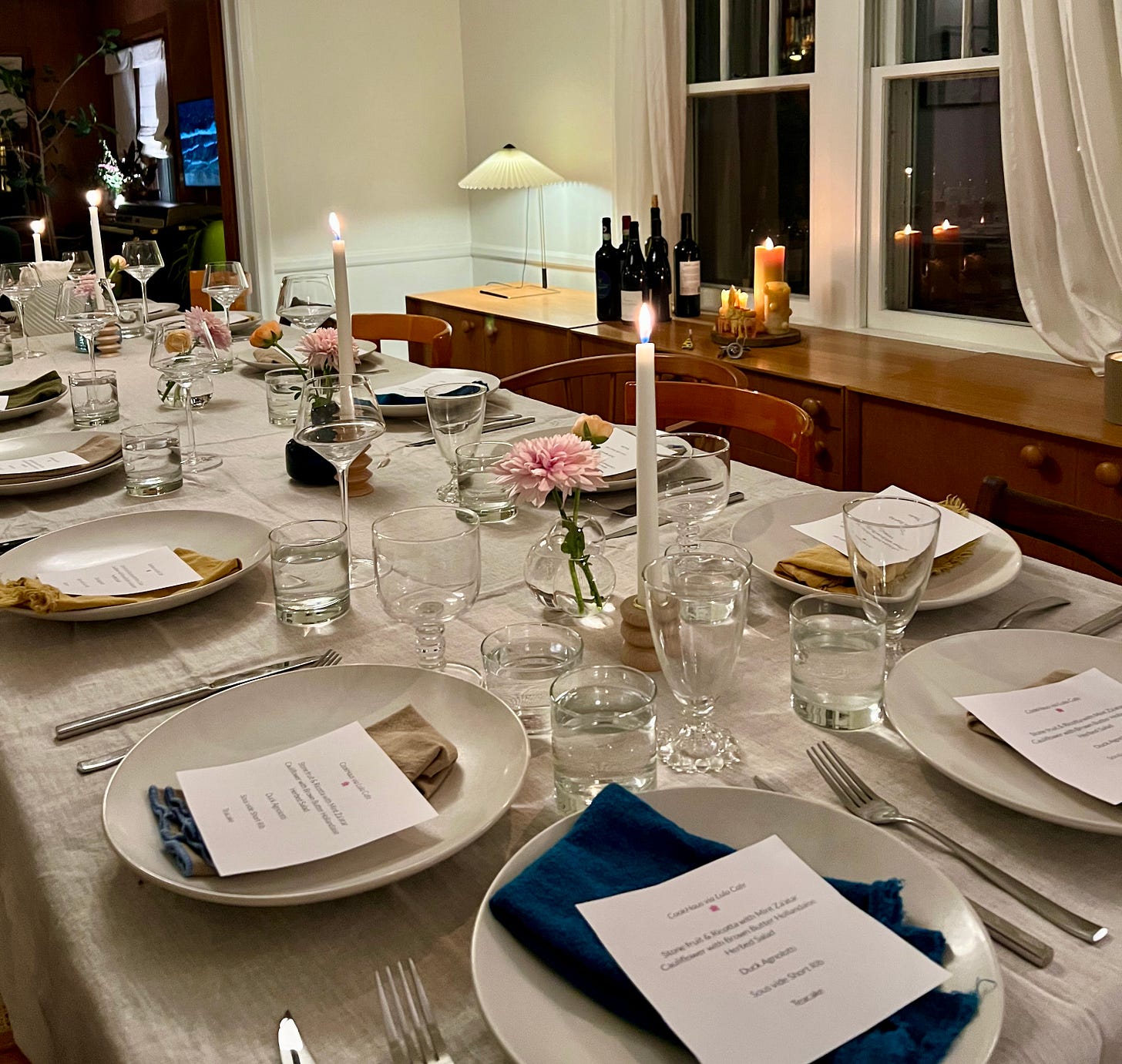
Love your prose, Josh. I hope one day to hold a collection of these essays in hard cover.
P.S. Great poem. 🤌
P.P.S. I’m getting this cookbook